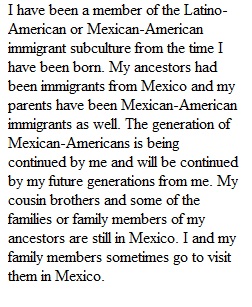


Q Anthropology 102 - Introduction to Cultural Anthropology - D. EarleUNIT I ESSAY - FIRST-HAND CULTURE OR SUBCULTURE DESCRIPTIONYou will prepare a short essay, at least 3 pages in length, double spaced, describing what appear to you to be the noteworthy characteristics of a culture or sub-culture that you have been a member of yourself. Imagine that an anthropologists from another culture comes to visit you and wishes to find out about a culture or sub-culture that you have belonged to, been a part of, and have participated in. This also means that other members of the culture or sub-culture recognize you as a full-fledged member, NOT a visitor or observer. Visiting the village in Greece where Grandpa was born does NOT make you a member of the culture of that village. Growing up in a Greek-American family where Greek heritage is part of the FAMILY culture you were born into makes you a member of the Greek-American immigrant subculture in the United States. The description of this culture or sub-culture will be as told by you from your own direct experience- you are the expert and the authority on this culture. You won't need to cite outside sources. You could write about a national culture like American culture, Mexican culture, Egyptian culture, Samoan culture, or other culture IF you have been a full-fledged member of that culture (not a visitor). You can also write about a sub-culture, a "part-culture" that you have been a member of in the United States. This may include having been raised in a family and even a community that has brought customs and traditions and values from a foreign culture or sub-culture. This kind of situation would be one example of an ethnic sub-culture within the United States culture. Other examples of sub-cultures might include religious (a church or other religious group) or occupational - military, police, medical field, retail, film, radio, car repair, ranching, etc.- sub-cultural groupings. Sub-cultures might also be avocational (a non-work activity a person is devoted to and that is a major part of their identity and of their relations with other people, like being a surfer, a competitive athlete, a musician, or an on-line gamer, etc., etc.). The key concepts for defining a sub-culture are that it is carried by a socially interacting group of people who share the sub-culture, and that the sub-culture has ways of defining who "belongs" and who doesn't belong. The sub-culture also has certain distinctive activities and behaviors shared by its members, and ways of achieving status and prestige within the sub-culture. Related to prestige is the idea of the existence of behavioral do's and don'ts, and also values that are distinctive for the sub-culture. Larger-scale national cultures will also have somewhat similar features. Any culture or sub-culture will have not only a) core values and beliefs that define that culture or sub-culture, but also b) a special vocabulary, "insider terminology", or lingo that will be understood and used by members of the culture or sub-culture and that will help define who are insiders in the culture or sub-culture because they know and understand the special language or terms. I, for example, belong to the sub-culture of archaeologists, and I can tell whether other people belong to the same sub-culture by their ability to correctly use our special subculture vocabulary or terminology, both formal and informal. For a national culture, membership in that culture is partly defined by use of a shared language, although other languages may be spoken as well. You will want to discuss any terms or phrases used by your culture or subculture that embody or exemplify its core values. Examples would be the terms Semper Fidelis for Marines or the Holy Trinity for members of Christian churches. These terms or phrases would be of particular interest to an anthropologist because they pack inside them, they symbolize, key values for the sub-cultures that use them. Please keep in mind that you must have been a full member and full participant of the culture or sub-culture that you write about- NOT a visitor, observer, tourist, or "wannabe". The essay is worth 30 points.
View Related Questions